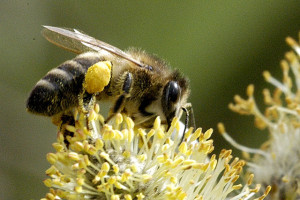Bee pollen is the pollen ball that has been packed by worker honeybees into pellets.Bee bread is also the bee pollen with added honey and bee secretions and stored in brood cells, chambers of wood and mud created by female ground-nesting bees. Pollen balls are harvested as food for humans. Bee pollen is sometimes referred to as ambrosia.
Contents
Uses
- Bee pollen has been touted by herbalists as a treatment for a variety of medical conditions, but there is no scientific evidence to show that it has any health benefits.
- Bee pollen is safe for short term use, but for those with pollen allergies, allergic reactions may occur (shortness of breath, hives, swelling, and anaphylaxis).
- Bee pollen is not safe for pregnant women and should not be used during breastfeeding. The Food and Drug Administration has warned against the use of some bee pollen products because they are adulterated with unapproved drugs including sibutramine and phenolphthalein.
Benefits
- Bee pollen is available at many health food stores. You may find bee pollen in other natural dietary supplements, as well as in skin softening products used for baby’s diaper rash or eczema.
- You may also hear recommendations for using bee pollen for alcoholism, asthma, allergies, health maintenance, or stomach problems, but there is no proof that it helps with these conditions. Before you take any natural product for a health condition, check with your doctor.
- Bee pollen is also recommended by some herbalists to enhance athletic performance, reduce side effects of chemotherapy, and improve allergies and asthma.
- At this point, medical research has not shown that bee pollen is effective for any of these health concerns.
Cautions
- Bee pollen appears to be safe, at least when taken for a short term. But if you have pollen allergies, you may get more than you bargained for. Bee pollen can cause a serious allergic reaction – including shortness of breath, hives, swelling, and anaphylaxis.
- Bee pollen is not safe for pregnant women. A woman should also avoid using bee pollen if she is breastfeeding.
- Bee pollen may cause increased bleeding if taken with certain blood thinners like warfarin. Check with your doctor before taking bee pollen if you take any medications, over-the-counter medicines, or herbals.
Interactions
It’s important to avoid confusing bee pollen with natural honey, honeycomb, bee venom, or royal jelly. These products do not contain bee pollen.
Other names
pollen ball
References
Source: Wikipedia, https://en.wikipedia.org/wiki/Bee_pollen
WebMD, http://www.webmd.com/balance/bee-pollen-benefits-and-side-effects

